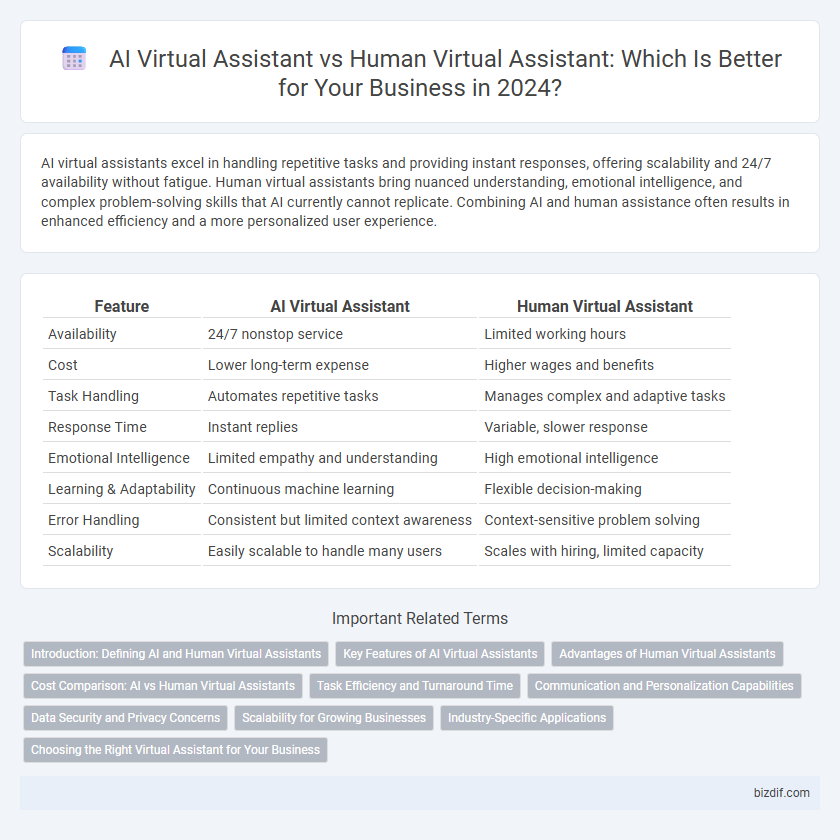AI virtual assistants excel in handling repetitive tasks and providing instant responses, offering scalability and 24/7 availability without fatigue. Human virtual assistants bring nuanced understanding, emotional intelligence, and complex problem-solving skills that AI currently cannot replicate. Combining AI and human assistance often results in enhanced efficiency and a more personalized user experience.
Table of Comparison
| Feature | AI Virtual Assistant | Human Virtual Assistant |
|---|---|---|
| Availability | 24/7 nonstop service | Limited working hours |
| Cost | Lower long-term expense | Higher wages and benefits |
| Task Handling | Automates repetitive tasks | Manages complex and adaptive tasks |
| Response Time | Instant replies | Variable, slower response |
| Emotional Intelligence | Limited empathy and understanding | High emotional intelligence |
| Learning & Adaptability | Continuous machine learning | Flexible decision-making |
| Error Handling | Consistent but limited context awareness | Context-sensitive problem solving |
| Scalability | Easily scalable to handle many users | Scales with hiring, limited capacity |
Introduction: Defining AI and Human Virtual Assistants
AI virtual assistants leverage advanced machine learning algorithms and natural language processing to perform tasks autonomously, offering efficient, round-the-clock support for scheduling, information retrieval, and customer service. Human virtual assistants provide personalized, empathetic interactions and handle complex, nuanced tasks requiring judgment and adaptability beyond current AI capabilities. Understanding the core differences in functionality and interaction style between AI and human virtual assistants helps businesses optimize resource allocation and improve user experience.
Key Features of AI Virtual Assistants
AI virtual assistants leverage natural language processing, machine learning algorithms, and real-time data integration to provide instant, personalized responses and automate repetitive tasks. Key features include 24/7 availability, scalability, multilingual communication, and the ability to analyze large datasets for predictive insights. These capabilities enable AI assistants to enhance productivity, reduce operational costs, and improve user engagement compared to human virtual assistants.
Advantages of Human Virtual Assistants
Human virtual assistants excel in understanding complex emotional cues and adapting communication styles to match individual client needs, providing personalized and empathetic support. Their ability to handle nuanced tasks requiring critical thinking and problem-solving surpasses current AI capabilities, ensuring higher accuracy and contextual awareness. Additionally, human virtual assistants offer flexibility and creativity in managing unexpected situations, fostering stronger client relationships and trust.
Cost Comparison: AI vs Human Virtual Assistants
AI virtual assistants significantly reduce operational costs by automating routine tasks without the need for salaries, benefits, or breaks. Human virtual assistants require higher ongoing expenses, including wages, training, and employee benefits, leading to increased overall costs. Businesses seeking scalable and budget-friendly solutions often favor AI assistants for efficient workload management and cost savings.
Task Efficiency and Turnaround Time
AI virtual assistants leverage advanced machine learning algorithms to complete repetitive tasks with exceptional speed and consistent accuracy, significantly reducing turnaround time compared to human virtual assistants. Human virtual assistants excel in handling complex, context-sensitive assignments requiring emotional intelligence and nuanced decision-making but typically have slower response times due to processing and multitasking limitations. Organizations benefit from deploying AI assistants for high-volume, time-sensitive tasks while relying on human assistants for personalized, strategic support.
Communication and Personalization Capabilities
AI virtual assistants excel in processing large volumes of data rapidly, enabling quick and consistent responses, while human virtual assistants provide nuanced understanding and empathy in communication. Personalization in AI assistants relies on algorithms analyzing user behavior and preferences, offering tailored interactions that improve over time, whereas human assistants leverage emotional intelligence to adapt communication style and anticipate needs dynamically. Combining AI's data-driven efficiency with human adaptability enhances communication quality and personalized service delivery.
Data Security and Privacy Concerns
AI virtual assistants leverage advanced encryption and anonymization techniques to safeguard user data, reducing risks associated with human error or intentional breaches common in human virtual assistants. Continuous monitoring and automated compliance with data protection regulations like GDPR enhance privacy, while human assistants may struggle with consistent adherence due to variable training and oversight. Despite AI's robust security protocols, organizations must implement strict access controls and audit trails to mitigate residual vulnerabilities and ensure comprehensive data protection.
Scalability for Growing Businesses
AI virtual assistants offer unparalleled scalability for growing businesses by handling large volumes of tasks simultaneously without fatigue, enabling continuous customer support and operational efficiency. Human virtual assistants provide personalized and context-rich interactions but face limitations in scaling due to finite working hours and increased costs with expansion. Integrating AI virtual assistants into business workflows allows seamless scaling while maintaining quality service delivery during rapid growth phases.
Industry-Specific Applications
AI virtual assistants excel in industry-specific applications by leveraging machine learning algorithms to analyze vast datasets, providing real-time, personalized support in sectors like healthcare, finance, and retail. Human virtual assistants offer nuanced understanding and adaptive problem-solving skills essential for complex client interactions and tasks requiring emotional intelligence in industries such as legal services and high-end consultancy. Combining AI efficiency with human empathy maximizes operational effectiveness and enhances customer satisfaction across specialized fields.
Choosing the Right Virtual Assistant for Your Business
AI virtual assistants offer 24/7 availability, rapid task automation, and cost-effective scalability, making them ideal for businesses seeking efficiency and consistent performance. Human virtual assistants provide personalized communication, complex problem-solving skills, and adaptability, which benefit businesses requiring nuanced customer interactions and creative support. Choosing the right virtual assistant depends on your business needs, prioritizing task complexity, interaction quality, and budget constraints.
AI virtual assistant vs Human virtual assistant Infographic

 bizdif.com
bizdif.com